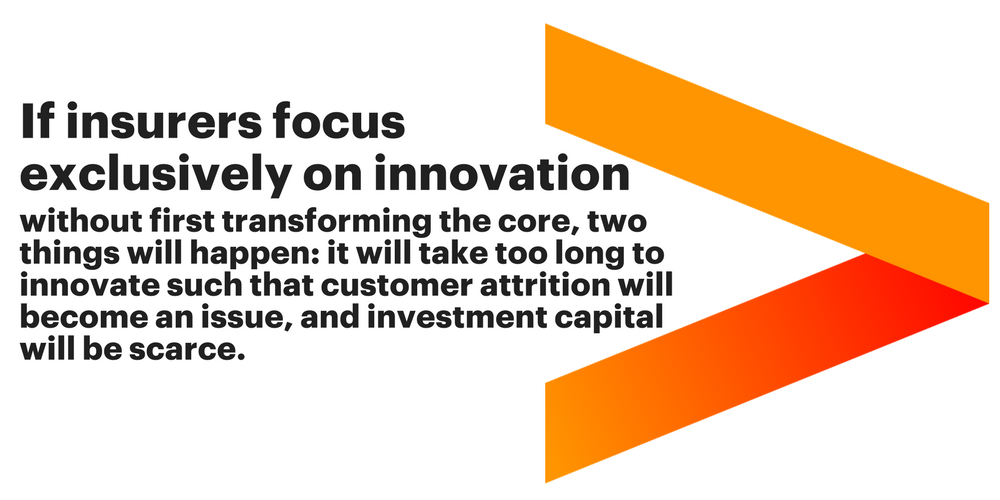Many insurers are focused on how to innovate, but most do not have a stable, cost-efficient core to support and fund their innovation efforts. Both are necessary.
We’ve all read the productivity articles about the world leader who eats the same thing for breakfast, repeats the same 40-minute workout and reads the newspaper in the exact same order. We’ve heard about elite athletes with rigid pre-game routines, down to the music they’ll listen to before the match. The take-home message from this is that you need a stable foundation if you’re going to do amazing things. And in the case of insurers, a stable, efficient core is essential to enabling innovation. A stable core is essential for innovation It’s easy to focus on the shiny, emerging technologies that promise to up-end the insurance industry: artificial intelligence (AI), the Internet of Things (IoT) and blockchain, to name a few. Do these things have far-reaching implications for insurance? Yes. Are there startups leveraging new technologies that may eventually disrupt the industry? Of course. But when many insurers still struggle to provide real omnichannel customer service, or offer timely and transparent claims settlement, it’s almost irresponsible to be asking which company or technology will disrupt insurance. Part of the issue is that the industry tends to clump two distinct opportunities together. First, there are the core competencies that insurers must master: the user experience, personalized offers, timely and transparent claims service. Get these pieces right, and you may not win—but do them poorly, and you will inevitably lose. Separate from this are the new technologies that capture headlines; if scaled successfully, these cool innovations can pave the way to an insurer’s future revenue streams.
Brilliant basics and cutting new ground
At Accenture, we call these two opportunities the Brilliant Basics and Cutting New Ground. By getting the Brilliant Basics right, insurers foster a stable core—the strong foundation that’s necessary to enable innovation, in the form of Cutting New Ground.
By injecting new digital technologies to transform the core, it becomes cheaper and more efficient to do the Brilliant Basics. This approach is aligned with what’s recommended by the Accenture Disruptability Index, which identified insurance as being vulnerable to disruption and recommended optimizing to improve structural productivity.
See also: Core Transformation – Start Your Engines!
Successful core transformation can create efficiencies, reduce the cost to serve and improve growth—all of which frees investment capital to fund Cutting New Ground initiatives. These innovation initiatives should be viewed like a portfolio of digital investments. Low-risk, low-reward projects may be more likely to succeed and deliver incremental growth. High-risk, high-reward projects may be less likely to succeed—but if they do, they can enable an insurer to establish a definitive competitive advantage. Given insurance’s risk aversion, it’s definitely a cultural shift to embark on a project knowing it may not succeed, so viewing Cutting New Ground as a portfolio of investments can be one way to mitigate cultural concerns.
Part of the issue is that the industry tends to clump two distinct opportunities together. First, there are the core competencies that insurers must master: the user experience, personalized offers, timely and transparent claims service. Get these pieces right, and you may not win—but do them poorly, and you will inevitably lose. Separate from this are the new technologies that capture headlines; if scaled successfully, these cool innovations can pave the way to an insurer’s future revenue streams.
Brilliant basics and cutting new ground
At Accenture, we call these two opportunities the Brilliant Basics and Cutting New Ground. By getting the Brilliant Basics right, insurers foster a stable core—the strong foundation that’s necessary to enable innovation, in the form of Cutting New Ground.
By injecting new digital technologies to transform the core, it becomes cheaper and more efficient to do the Brilliant Basics. This approach is aligned with what’s recommended by the Accenture Disruptability Index, which identified insurance as being vulnerable to disruption and recommended optimizing to improve structural productivity.
See also: Core Transformation – Start Your Engines!
Successful core transformation can create efficiencies, reduce the cost to serve and improve growth—all of which frees investment capital to fund Cutting New Ground initiatives. These innovation initiatives should be viewed like a portfolio of digital investments. Low-risk, low-reward projects may be more likely to succeed and deliver incremental growth. High-risk, high-reward projects may be less likely to succeed—but if they do, they can enable an insurer to establish a definitive competitive advantage. Given insurance’s risk aversion, it’s definitely a cultural shift to embark on a project knowing it may not succeed, so viewing Cutting New Ground as a portfolio of investments can be one way to mitigate cultural concerns.
 Consequently, insurers need both pieces. Brilliant Basics can enable a stable core and generate investment capital that make it possible for insurers to focus on Cutting New Ground. Brilliant Basics is the elite athlete’s pre-game routine; Cutting New Ground is the game-winning performance, and maybe a record-breaking one at that.
To get started, insurers should consider the following questions:
Consequently, insurers need both pieces. Brilliant Basics can enable a stable core and generate investment capital that make it possible for insurers to focus on Cutting New Ground. Brilliant Basics is the elite athlete’s pre-game routine; Cutting New Ground is the game-winning performance, and maybe a record-breaking one at that.
To get started, insurers should consider the following questions:
- What are your Brilliant Basics and what will it take to deliver them?
- What are the foundational capabilities required to both deliver those Brilliant Basics and to set up the organization for cutting-edge innovation?
- What is Cutting New Ground for the industry in general, and your organization in particular?








